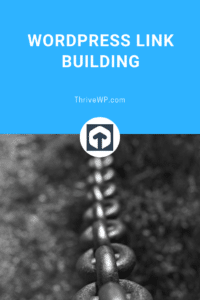The early internet era was an exciting, if chaotic time.
Around the turn of the millennium, Google was already a major force as a search engine, even if it didn’t hold the de facto ‘King of Search Engines’ title which it does now.
Search engine optimisation was in full swing, but some of the methods being used to bump up Google rankings were very different from those used in the modern day.
You might remember the ‘keyword stuffing’ which used to take place in an effort to make a page rank for a specific search term.
And when it came to link building, the techniques used would undoubtedly be viewed as questionable today.
Among the ‘blackhat’ strategies was acquiring a large number of cheap domains, and then using them exclusively for the ‘plastering’ of links, in order to improve the SEO of a certain website.
Other methods were spamming your link on every forum you could find and anywhere else for that matter. The more links the better was the general idea.
Looking for a complete WordPress Maintenance Plan?
With all ThriveWP care plans, we include free migration, malware removal, daily/hourly backups, plugin theme and core updates, ongoing support and 24/7 security monitoring and firewall.
In today’s search conditions, those kinds of blackhat techniques simply don’t cut it and will most likely get your site penalised or even removed from googles rankings all together!
The Google algorithm has become more sophisticated, and just as it has learned to decipher quality content from copy which exists purely for SEO, the search engine now places a higher value on links which are ‘organic’, appearing on trusted platforms.
From black to whitehat
In many ways, the maturing of the Google algorithm has provided a reason for many SEO experts to ‘play fair’, sculpting quality content to be placed on well-respected media platforms and social media networks.
One of these whitehat techniques is backlinking but not as you used to know it – so how does it work, and what does it offer?
What is backlinking?
Backlinking is the placing of URLs which direct web users back to a certain website from respected, trusted and well-read platforms, with the effect of boosting that site’s SEO. Magazine and newspaper online platforms, social media networks, and consumer websites can all be preferred targets for backlinks.
Rather than using any underhand techniques, the skilled backlinker should today rely on creating quality, shareable content and targeting it at the right people.
That doesn’t mean writing a great article and then spamming inboxes asking for links. We have moved passed this as well. Yes, reciprocal links can at times be useful but Google is much more sophisticated these days and will soon cotton on that you have just swapped links or asked a load of people to add your link to their site.
Ideally gaining backlinks today should be all about the content you shouldn’t have any involvement in gaining a backlink at all. In other words, you need to write awesome content that people want to share and reference in articles.
Backlinks needn’t just be there for the purposes of SEO. They can also provide useful links for a reader or viewer, which provides them more information or directs them to a related content item on a certain subject.

The benefits of backlinking
Google views backlinks as a good indicator of a site’s value, meaning that building your number of backlinks can offer the opportunity to improve Google rankings.
Backlinking does not involve tricking or fooling anybody, and it actually encourages the creation of interesting, entertaining or informative content for a particular audience – how can that be a bad thing?
A backlinking campaign can feed into SEO in other ways.
By directing more visitors to a site, footfall can be increased. And traffic to your site is another ranking factor. By gaining links, there is more chance of your content ‘going viral’, which can also lead to more visitors coming to your site.
And if you are looking for leads, directing more potential customers to your site can offer more exposure to your product or service, offering the possibility of increased conversions.
Get connecting
One important consideration when seeking to improve ranking with white hat link building is a contact list. You should endeavour to build contacts – from site admins to journalists – on the platforms you wish to target and to communicate with them appropriately.
This can be a delicate process which takes time, and involves more effort than simply ‘cold emailing’.
So that is the story of how link building turned from black to whitehat – seemingly to everyone’s advantage!
I hope you now have more of an understanding of the backlinking devil which scares many people. It’s not that it’s bad or that Google will penalise you, it’s about doing it differently and making sure your content is good enough to share and gain NATURAL backlinks, not ones you created, forced or begged for.
Do you need WordPress Maintenance Services?






